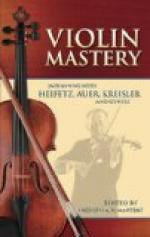a quality all its own in playing it. That technic,
however, is a means, not an end, Professor Auer never
allowed his pupils to forget. He is a wonderful
master of interpretation. I studied the great
concertos with him—Beethoven, Bruch, Mendelssohn,
Tschaikovsky, Dvorak*, the Brahms concerto (which I
prefer to any other); the Vieuxtemps Fifth and Lalo
(both of which I have heard Ysaye, that supreme artist
who possesses all that an artist should have, play
in Berlin); the Elgar concerto (a fine work which I
once heard Kreisler, an artist as great as he is modest,
play wonderfully in Petrograd), as well as other concertos
of the standard repertory. And Professor Auer
always sought to have us play as individuals; and
while he never allowed us to overstep the boundaries
of the musically esthetic, he gave our individuality
free play within its limits. He never insisted
on a pupil accepting his own
nuances of interpretation
because they were his. I know that when playing
for him, if I came to a passage which demanded an
especially beautiful
legato rendering, he would
say: ‘Now show how you can sing!’
The exquisite
legato he taught was all a matter
of perfect bowing, and as he often said: ’There
must be no such thing as strings or hair in the pupil’s
consciousness. One must not play violin, one must
sing violin!’
Transcriber’s note:
Original text read “Dvorak”.
FIDDLE AND
STRINGS
“I do not see how any artist can use an instrument
which is quite new to him in concert. I never
play any but my own Guadagnini, which is a fine fiddle,
with a big, sonorous tone. As to wire strings,
I hate them! In the first place, a wire E sounds
distinctly different to the artist than does a gut
E. And it is a difference which any violinist will
notice. Then, too, the wire E is so thin that
the fingers have nothing to take hold of, to touch
firmly. And to me the metallic vibrations, especially
on the open strings, are most disagreeable. Of
course, from a purely practical standpoint there is
much to be said for the wire E.
VIOLIN MASTERY
“What is violin mastery as I understand it?
First of all it means talent, secondly technic, and
in the third place, tone. And then one must be
musical in an all-embracing sense to attain it.
One must have musical breadth and understanding in
general, and not only in a narrowly violinistic sense.
And, finally, the good God must give the artist who
aspires to be a master good hands, and direct him to
a good teacher!”
XX
EDMUND
SEVERN
THE
JOACHIM BOWING AND OTHERS:
THE
LEFT HAND




